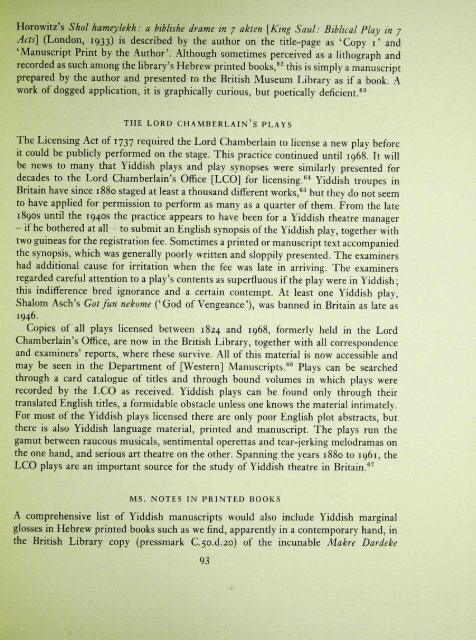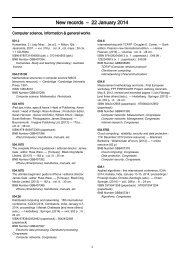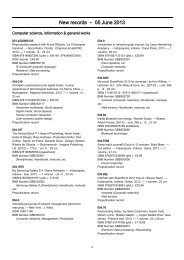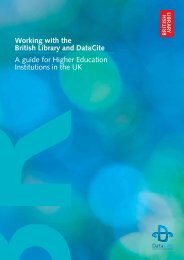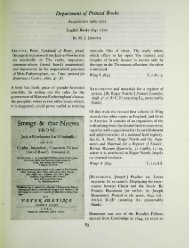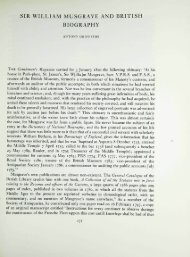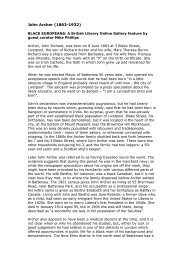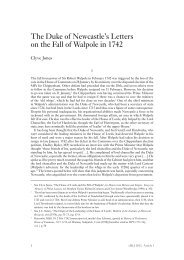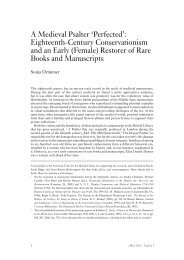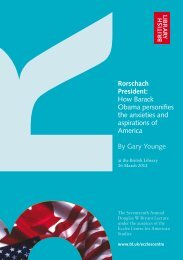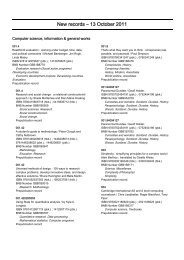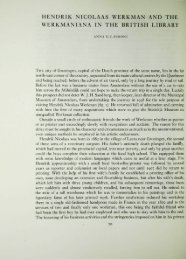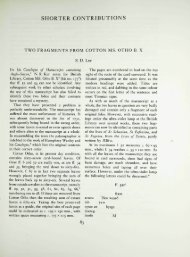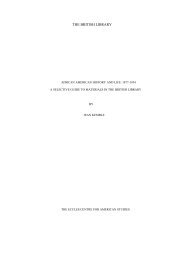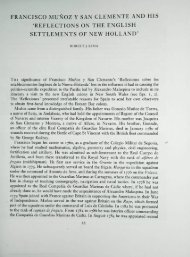YIDDISH MANUSCRIPTS IN THE BRITISH LIBRARY
YIDDISH MANUSCRIPTS IN THE BRITISH LIBRARY
YIDDISH MANUSCRIPTS IN THE BRITISH LIBRARY
You also want an ePaper? Increase the reach of your titles
YUMPU automatically turns print PDFs into web optimized ePapers that Google loves.
Horowitz's Shol hameylekh: a biblishe drame in 7 akten [King Saul: Biblical Play in 7<br />
Acts] (London, 1933) is described by the author on the title-page as 'Copy T and<br />
'Manuscript Print by the Author'. Although sometimes perceived as a lithograph and<br />
recorded as such among the library's Hebrew printed books/^ this is simply a manuscript<br />
prepared by the author and presented to the British Museum Library as if a book. A<br />
work of dogged application, it is graphically curious, but poetically deficient.^^<br />
<strong>THE</strong> LORD CHAMBERLA<strong>IN</strong>'S PLAYS<br />
The Licensing Act of 1737 required the Lord Chamberlain to license a new play before<br />
it could be publicly performed on the stage. This practice continued until 1968. It will<br />
be news to many that Yiddish plays and play synopses were similarly presented for<br />
decades to the Lord Chamberlain's Office [LCO] for licensing. ^^ Yiddish troupes in<br />
Britain have since 1880 staged at least a thousand different works,^'^ but they do not seem<br />
to have applied for permission to perform as many as a quarter of them. From the late<br />
1890s until the 1940s the practice appears to have been for a Yiddish theatre manager<br />
- if he bothered at all - to submit an English synopsis of the Yiddish play, together with<br />
two guineas for the registration fee. Sometimes a printed or manuscript text accompanied<br />
the synopsis, which was generally poorly written and sloppily presented. The examiners<br />
had additional cause for irritation when the fee was late in arriving. The examiners<br />
regarded careful attention to a play's contents as superfluous if the play were in Yiddish;<br />
this indifference bred ignorance and a certain contempt. At least one Yiddish play,<br />
Shalom Asch's Got fun nekome ('God of Vengeance'), was banned in Britain as late as<br />
1946.<br />
Copies of all plays licensed between 1824 and 1968, formerly held in the Lord<br />
Chamberlain's Office, are now in the British Library, together with all correspondence<br />
and examiners' reports, where these survive. All of this material is now accessible and<br />
may be seen in the Department of [Western] Manuscripts.^^ Plays can be searched<br />
through a card catalogue of titles and through bound volumes in which plays were<br />
recorded by the LCO as received. Yiddish plays can be found only through their<br />
translated English titles, a formidable obstacle unless one knows the material intimately.<br />
For most of the Yiddish plays licensed there are only poor English plot abstracts, but<br />
there is also Yiddish language material, printed and manuscript. The plays run the<br />
gamut between raucous musicals, sentimental operettas and tear-jerking melodramas on<br />
the one hand, and serious art theatre on the other. Spanning the years 1880 to 1961, the<br />
LCO plays are an important source for the study of Yiddish theatre in Britain.^^<br />
MS. NOTES <strong>IN</strong> PR<strong>IN</strong>TED BOOKS<br />
A comprehensive list of Yiddish manuscripts would also include Yiddish marginal<br />
glosses in Hebrew printed books such as we find, apparently in a contemporary hand, in<br />
the British Library copy (pressmark C.5o.d.2o) of the incunable Makre Dardeke<br />
93


